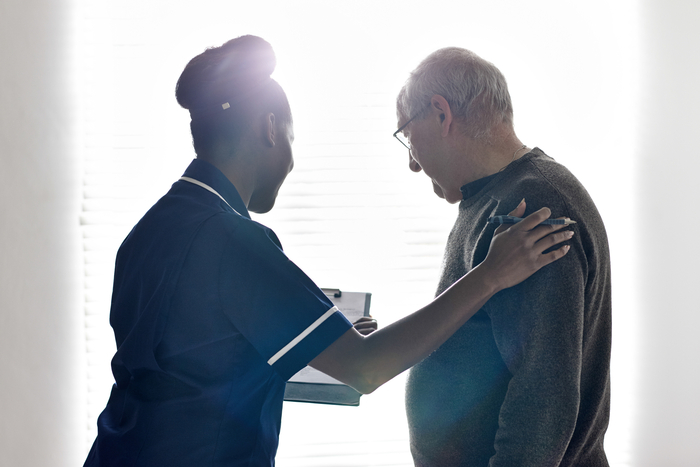Keeping up with your prostate health can save your life
February 16, 2023
 It’s out of sight and usually out of mind, but the prostate – the walnut-sized gland that sits between the bladder and the penis, in front of the rectum, in men – cannot be ignored. It produces a fluid that is important in male fertility, as well as another fluid that lubricates the spinal cord. In addition, urine passes through the urethra, which goes through the prostate. If there is an issue with the prostate, such as prostate cancer, it can affect a man’s health, self-image and lifestyle.
It’s out of sight and usually out of mind, but the prostate – the walnut-sized gland that sits between the bladder and the penis, in front of the rectum, in men – cannot be ignored. It produces a fluid that is important in male fertility, as well as another fluid that lubricates the spinal cord. In addition, urine passes through the urethra, which goes through the prostate. If there is an issue with the prostate, such as prostate cancer, it can affect a man’s health, self-image and lifestyle.
And those issues are not unusual. Prostate cancer is one of the most common forms of cancer among men. According to the Centers for Disease Control and Prevention, 13 out of every 100 men will get prostate cancer in their lifetime, and on average three of those men will die because of it.
Fortunately, prostate cancer can be detected early with simple testing, including a rectal exam by the physician or a prostate-specific antigen (PSA) test. This simple blood test is commonly used to measure the blood level of a protein (called PSA) that is created in the prostate. The test can be performed in the office by a primary care doctor or urologist. It’s recommended to get tested annually — this is especially true for African American men, who are more likely to be diagnosed with prostate cancer and twice as likely to die from it.
Prostate cancer can also be triggered by genetic factors such as family health history. If one or more immediate family members have had prostate cancer, you should mention it to your doctor.
Symptoms of prostate cancer:
- Difficulty urinating
- Frequent urination
- Blood in urine or semen
- Painful or burning urination
- Trouble emptying bladder
- Painful ejaculation
- Pain in the back, hips and/or pelvis
If you experience any of these symptoms, contact your physician immediately.
Even if you aren’t experiencing symptoms, all men 55 to 69 years old should talk to their doctor about getting routinely screened. Men who are 70 and older generally can skip routine screenings.
Lower Your Risk
The following are proven strategies and behaviors to lessen your risk of cancer in general:
Lower alcohol consumption (or stop altogether)
- Drinking alcohol increases your risk of several types of cancer. It also impacts your sleep, mental health, skin, energy levels and weight. Men are recommended to keep consumption to two drinks daily (one for women).
Get moving
- Around 40% of all cancers can be associated with being overweight or obese.
- Regular physical activity can improve your brain health, strengthen bones and muscles, improve your sleep, lower stress and even lower blood pressure –to name a few benefits.
Protect yourself from the sun
- Ultraviolet rays from the sun can be extremely harmful to your skin. Wear SPF, protective clothing/gear (hat, sleeves, sunglasses) and stay out of the direct sun when you can.
Eat colorfully
- In general, eating healthily allows your body to function at its best potential. Limiting sugar intake has a number of benefits. It reduces the risk of disease, lowers risk of depression and aids in weight management, and more.
- Fill your plate with brightly colored fruits and vegetables, and steer clear from overly processed snacks.
When it comes to your health, be proactive instead of reactive. Taking preventive action is a great way to avoid becoming stressed and overwhelmed.
